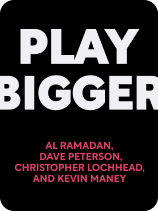

This article is an excerpt from the Shortform book guide to "Play Bigger" by Al Ramadan, Dave Peterson, et al.. Shortform has the world's best summaries and analyses of books you should be reading.
Like this article? Sign up for a free trial here.
What is the purpose of a long-term marketing strategy? How can you stay relevant in the market?
The book Play Bigger advises how to keep your business afloat in the competitive market. The authors suggest a long-term marketing strategy that includes creating a new market and expanding it to another market.
Let’s look at their long-term marketing strategy so your business stays at the top.
Remaining the Market Winner
By now, you should’ve solidified your market in customers’ minds and made yourself that market’s winner. The authors explain how to remain the market winner with a long-term marketing strategy that requires two steps: 1) by expanding your market or creating another new market and 2) by establishing a flywheel effect in that market.
The authors claim that you must complete the first step because every company eventually reaches most customers in its market and must either create a new market or expand its current market to continue growing. Companies must do this over and over to remain market winners. For instance, you’ll eventually reach all customers who want to minimize their tech use in your low-tech devices market and might therefore expand that market to include customers who not only want to be on their phones less, but also want to use more analog products, by selling paper agendas, notepads, and so on.
Then, create a flywheel in that new market because, as we’ve discussed, a flywheel composed of aligned company, market, and product makes you the market winner. Beyond aligning company, market, and product, the authors recommend pushing the flywheel forward by strengthening your company take, holding continued events and campaigns, collecting data that lets you build better products, and hiring the right talent. Your company might thus refine its take as it grows, elaborating on the problem it helps solve. You might also ask job applicants specific questions that help determine if they’re a good cultural fit.
(Shortform note: Jim Collins, who writes about flywheels in Good to Great, adds acquisitions of other companies to the list of steps you can take to push your flywheel forward. However, he contends that you should only acquire other companies once your flywheel is already spinning. If that’s the case, then we might also consider that you should only take the steps the authors list to bolster your flywheel—continued events and campaigns, collecting data, hiring the right talent, and so on—once your flywheel is already spinning. In other words, focus on the core elements of your business before turning to ancillary elements to give yourself an added boost.)
Another Long-Term Marketing Strategy: Blitzscaling
In Blitzscaling, Reid Hoffman and Chris Yeh agree with the authors on the need to expand your market (or scale up) as a long-term marketing strategy but add that you must do so as quickly as possible, referring to this as blitzscaling. They contend that because startups grow and fade away at a rapid pace, it’s better to scale quickly with an imperfect understanding of the market than to scale slowly with sound information because being late pushes you out of the competition entirely.
Hoffman and Yeh warn that blitzscaling is dangerous because if you scale too quickly, your company might not be able to keep up with demand and could fall apart. However, if you’ve followed the Play Bigger authors’ advice to build your company, market, and product simultaneously so they support each other, you likely won’t have to worry as much about your company not being able to keep pace with demand: It will be inherently designed to grow sustainably.

———End of Preview———
Like what you just read? Read the rest of the world's best book summary and analysis of Al Ramadan, Dave Peterson, et al.'s "Play Bigger" at Shortform.
Here's what you'll find in our full Play Bigger summary:
- Why financial success doesn't depend on education or intelligence
- Why the key to financial success lies in understanding human behavior
- How to create a financial strategy you can follow for decades






